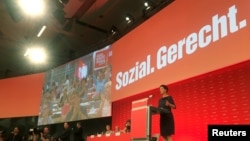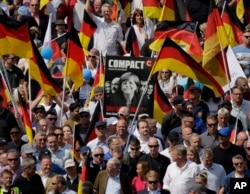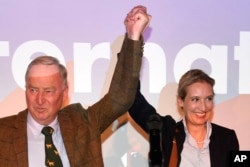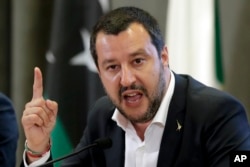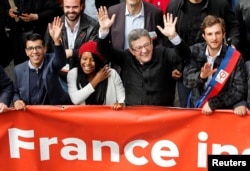Europe's centrists have seen themselves squeezed by populists from right and left but an even bigger challenge is forming, say analysts. Eurosceptic, nationalistic, anti-establishment parties from opposite ends of the political spectrum are starting to collaborate and to echo each other even more in their denunciations of liberal elites, NATO, globalization and Muslim refugees.
In Germany, far-right populists have been applauding a new leftist movement called Aufstehen, meaning Stand Up.
Founded by Sahra Wagenknecht, a lawmaker and author, who's also a co-chair of Die Linke, a socialist party which merged with former east German Communists, Aufstehen presents a leftist case for limiting migration and aims to stem the defection of provincial voters to the far-right Alternative for Germany, or AfD, which is now the main opposition party in the German parliament.
Stand Up's manifesto is set to be published next month, but its founding principle is to rally traditional working-class voters who've been alienated by the lifestyle' libertarian politics pursued by the establishment left represented by the Social Democrats, currently a junior partner in Angela Merkel's coalition government, and Wagenknecht's Die Linke.
More than 700,000 Social Democratic Party (SPD) voters defected to the far-right at last year's elections. Die Linke lost nearly half-a-million voters to AfD and the Greens 330,000.
Exit polling suggests that AfD's opposition to migration was the key element in propelling it into the Bundestag, marking a startling new phase in the party's progress from the fringe of German politics closer to the center of power in Berlin.
Wagenknecht wants Aufstehen to become a leftwing alternative to AfD and is arguing for strict limits to be placed on refugees on the grounds they are forcing down the wages of German workers. She has forcefully criticized Merkel's open-border policies, as does the far-right.
"This is about courage to overcome the neoliberal mainstream, about a social policy in the interest of the majority," Wagenknecht told Nachdenkenseiten.de, an online news portal. "The globalization steered by corporations, the disintegration of the welfare state, an endless string of new wars — this not a force of nature. There are alternatives to it and we want to give people back the hope that politics can be changed," she said.
Such comments have met with the approval of far-right figures, including AfD leader Alexander Gauland, who has applauded her anti-migration stance and shares her pro-Russian sentiments. He has offered to cooperate with Wagenknecht in a red-brown' alliance to campaign, among other things, on workers' rights, and in state parliaments, if they have sufficient seats following regional elections next year to form coalition governments.
Both Garland and Wagenknecht cast doubt on allegations of Kremlin involvement in the poisoning earlier this year in Britain of a former Russian spy and his daughter. The poisoning prompted collective Western expulsions of Russian diplomats and this month the imposition of more U.S. sanctions on Russia.
Jurgen Elsasser, editor of Compact, a monthly political magazine aligned with the AfD, regularly praises Wagenknecht, arguing the traditional left has lost touch with its anti-capitalist roots, something he believes Wagenknecht understands.
In a recent article he urged Wagenknecht and her husband, Oskar Lafontaine, a former German finance minister, to transform Stand Up into an electoral party.
"The AfD would then finally have a coalition partner who would be more reliable than the old parties," he wrote recently, likening such a prospect to the coalition government in Italy between the far-right Lega and the anti-establishment Movimento Cinque Stelle.
France's venerable leftwing daily newspaper Libération has condemned Stand Up. As have German Social Democrats, who fear Stand Up echoes and amplifies AfD rhetoric, rather than helping to combat it. "The muse of the radical left is leaning towards the extreme right when it comes to migrants," the paper warned, saying that her "tirades flirt regularly with the rhetoric of the AfD."
But it isn't only in Germany and Italy that politics are mutating and throwing up strange opportunistic collaborations and alignments — much as was seen in the 1930s in Europe when populist left and right at times would rub shoulders in their mutual opposition to liberals and social democrats, eroding in the process the center ground of politics.
Wagenknecht says the inspiration for Stand Up was La France Insoumise, or Insubordinate France, the populist leftist movement founded by Jean-Luc Mélenchon, a candidate in France's last presidential elections. He garnered 19 percent of the vote in the final run-off.
Mélenchon, the 65-year-old former senator and former junior Socialist minister, is also Russia-friendly, a critic of NATO who wants France to withdraw from EU treaties. He has targeted foreign newcomers, declaring that he's "never been in favor of freedom of arrival" and disapproves of migrants "stealing the bread" of French workers.
The faces of the more authoritarian far-left and far-right are merging on the key issues of immigration, the EU and Russia, as the different ends of the political spectrum seek to capitalize on the rage animating European voters.
A report last year on the future of Europe by Britain's Chatham House noted "there is a pronounced divide between more liberal and authoritarian-minded groups, particularly on issues of identity. This divide plays a much stronger role than other measures, such as economic status or experience of social hardship, in shaping attitudes." It added: "The political challenges resulting from this divide are likely to persist for many years."




